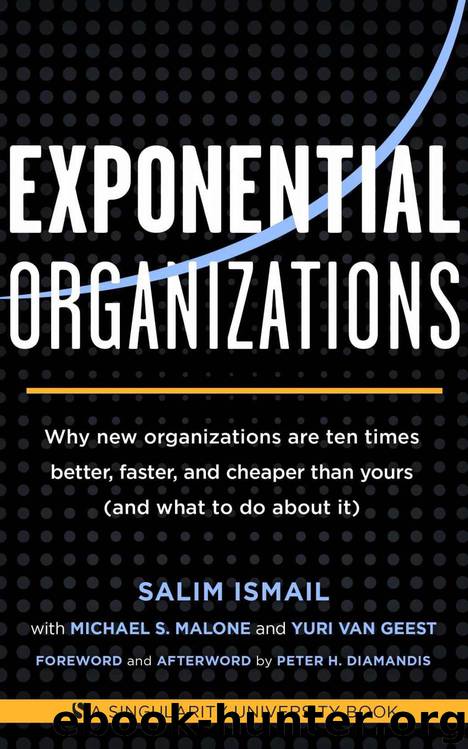Exponential Organizations: Why new organizations are ten times better, faster, and cheaper than yours (and what to do about it) by Salim Ismail & Michael S. Malone & Yuri van Geest

Author:Salim Ismail & Michael S. Malone & Yuri van Geest [Ismail, Salim]
Language: eng
Format: epub, mobi
ISBN: 9781626813588
Publisher: Diversion Books
Published: 2014-10-18T03:00:00+00:00
What if Larry Page and Sergey Brin had stopped pitching after 340 attempts? The world would be a very different place today. Just as intriguing: what magical technologies and businesses don’t exist today because the founders gave up one investor pitch too soon?
We’ve said this already, but it can’t be emphasized enough: Entrepreneurial success rarely comes from the idea. Instead, it comes from the founding team’s never-say-die attitude and relentless execution. Those who really want something will find options. Those who just kind of want it will find reasons and excuses. This has been the case since Hewlett and Packard started their business in that now-famous Palo Alto dirt-floor garage—where, don’t forget, they began with a passion and not a product. In the end, only raw, unbridled passion can solve an important problem and overcome the endless hurdles that present themselves. As investor Fred Wilson says, “Startups should be hunch-driven early on, and data-driven as they scale.”
PayPal co-founder Peter Thiel builds on this with a profound question for startup founders: “Tell me something you believe is true but [that] you have a hard time trying to convince others [of].” This is about conviction and passion on the one hand, and radical, unconventional, breakthrough ideas on the other. As Peter Diamandis is fond of saying, “The day before a major breakthrough, it is just a crazy idea.”
To illustrate: In a recent conversation with Elon Musk, Salim asked Musk about his Hyperloop concept: “Elon, I have a background in physics and it seems impossible to accelerate humans to 1,000 kilometers an hour and then decelerate them to zero in such a short space of time. Have you thought about that?”
Musk’s answer? “Yes, it’s an issue.”
To a true entrepreneur, there are no impossibilities, just barriers to overcome. (And yes, it turned out there is a solution to that particular physics problem—quite an easy one, in fact—via fluid dynamics).
As mentioned earlier, Chris Anderson’s DIY Drones product ArduCopter replicates 98 percent of the functionality of a military-grade Predator drone at one-thousandth the cost. That’s a drone for less than $1,000. It’s also transformational. Note the sudden appearance of drones in the planning agendas of companies as diverse as Amazon, QuiQui and UPS. This is not a coincidence.
Such breakthrough thinking also inspires. At Singularity University, students form teams in major problem spaces such as healthcare, education, clean water and so on. They are then given the challenge of coming up with a product or service that could positively impact a billion people within a decade [MTP]. One team, which called itself Matternet, chose poverty as its problem space after reading that 85 percent of all roads in Africa are regularly washed out during the wet season.
But how do you alleviate poverty if you can’t easily transport people or items? That question led Matternet to home in on “Transportation in Developing Countries” as its MTP. When Anderson described his DIY Drones idea in a lecture, the team had an epiphany: In the same way that Africa leapfrogged
Download
Exponential Organizations: Why new organizations are ten times better, faster, and cheaper than yours (and what to do about it) by Salim Ismail & Michael S. Malone & Yuri van Geest.mobi
This site does not store any files on its server. We only index and link to content provided by other sites. Please contact the content providers to delete copyright contents if any and email us, we'll remove relevant links or contents immediately.
Rich Dad Poor Dad by Robert T. Kiyosaki(6641)
Bad Blood by John Carreyrou(6624)
Principles: Life and Work by Ray Dalio(6457)
Playing to Win_ How Strategy Really Works by A.G. Lafley & Roger L. Martin(6315)
Management Strategies for the Cloud Revolution: How Cloud Computing Is Transforming Business and Why You Can't Afford to Be Left Behind by Charles Babcock(4573)
The Confidence Code by Katty Kay(4265)
Thinking in Bets by Annie Duke(4229)
American Kingpin by Nick Bilton(3891)
Delivering Happiness by Tony Hsieh(3430)
Project Animal Farm: An Accidental Journey into the Secret World of Farming and the Truth About Our Food by Sonia Faruqi(3221)
The Power of Habit by Charles Duhigg(3141)
The Tyranny of Metrics by Jerry Z. Muller(3076)
The Marketing Plan Handbook: Develop Big-Picture Marketing Plans for Pennies on the Dollar by Robert W. Bly(3067)
Brotopia by Emily Chang(3056)
Mastering Bitcoin: Programming the Open Blockchain by Andreas M. Antonopoulos(3047)
I Live in the Future & Here's How It Works by Nick Bilton(3001)
The Content Trap by Bharat Anand(2927)
Building a StoryBrand by Donald Miller(2916)
Applied Empathy by Michael Ventura(2906)
